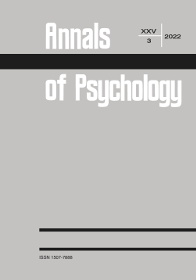Affectivity and Self-Forgiveness. The Role of Control of Negative Emotions: Short Report
Abstract
Self-forgiveness is a process in which emotions, thoughts, and behaviours towards oneself are changed from negative to neutral or positive.. In this study, we examined affectivity and emotional control (of anger, depression, anxiety) as emotional factors promoting or discouraging self-forgiveness. We examined self-forgiveness among Polish adults (N = 380, Mage = 36.26). Respondents completed the Polish version of the Positive Affect Negative Affect Scale, the Courtauld Emotional Control Scale (CECS), and the self-forgiveness subscale of Touissant’s Forgiveness Scale. In our cross-sectional study, we tested the moderating role of emotional control in the relationship between affectivity and self-forgiveness. Our results showed that positive affect was positively correlated with self-forgiveness, whereas negative affect was inversely correlated with self-forgiveness. Additionally, emotional control (anger, depression) was negatively correlated with self-forgiveness. Finally, total control of emotions and control of anger were found to be buffers between negative affect and self-forgiveness, the effect of negative affect on self-forgiveness being weaker among individuals who were more anger-controlling. The obtained results are a prelude to further research into the relationship between affectivity and self-forgiveness.
References
Ascioglu Onal, A., & Yalcin, I. (2017). Forgiveness of others and self-forgiveness: The predictive role of cognitive distortions, empathy, and rumination. Eurasian Journal of Educational Research, 17(68), 97–120. https://doi.org/10.14689/ejer.2017.68.6
Bahl, N., & Ouimet, A. J. (2022). Smiling won’t make you feel better, but it might make people like you more: Interpersonal and intrapersonal consequences of response-focused emotion regulation strategies. Journal of Social and Personal Relationships, 39(7), 2262–2284. https://doi.org/10.1177/02654075221077233
Bonanno, G. A., Papa, A., Lalande, K., Westphal, M., & Coifman, K. (2004). The importance of being flexible: The ability to both enhance and suppress emotional expression predicts long-term adjustment. Psychological Science, 15(7), 482–487. https://doi.org/10.1111/j.0956-7976.2004.00705.x
Brans, K., Koval, P., Verduyn, P., Lim, Y. L., & Kuppens, P. (2013). The regulation of negative and positive affect in daily life. Emotion, 13(5), 926–939. https://doi.org/10.1037/a0032400
Bryan, A. O., Theriault, J. L., & Bryan, C. J. (2015). Self-forgiveness, posttraumatic stress, and suicide attempts among military personnel and veterans. Traumatology, 21(1), 40–46. https://doi.org/10.1037/trm0000017
Dalgleish, T., Yiend, J., Schweizer, S., & Dunn, B. D. (2009). Ironic effects of emotion suppression when recounting distressing memories. Emotion, 9(5), 744–749. https://doi.org/10.1037/a0017290
Davis, D. E., Ho, M. Y., Griffin, B. J., Bell, C., Hook, J. N., Van Tongeren, D. R., … & Westbrook, C. J. (2015). Forgiving the self and physical and mental health correlates: A meta-analytic review. Journal of Counseling Psychology, 62(2), 329–335. https://doi.org/10.1037/cou0000063
Fitzgibbons, R. P. (1986). The cognitive and emotive uses of forgiveness in the treatment of anger. Psychotherapy: Theory, Research, Practice, Training, 23(4), 629–633. https://doi.org/10.1037/h0085667
Germain, C. L., & Kangas, M. (2015). Trait anger symptoms and emotion regulation: The effectiveness of reappraisal, acceptance and suppression strategies in regulating anger. Behaviour Change, 32(1), 35–45. https://doi.org/10.1017/bec.2014.28
Green, M., DeCourville, N., & Sadava, S. (2012). Positive affect, negative affect, stress, and social support as mediators of the forgiveness–health relationship. The Journal of Social Psychology, 152(3), 288–307. https://doi.org/10.1080/00224545.2011.603767
Gross, J. J. (1998). The emerging field of emotion regulation: an integrative review. Review of General Psychology, 2(3), 271–299.
Hall, J. H., & Fincham, F. D. (2005). Self-forgiveness: The stepchild of forgiveness research. Journal of Social and Clinical Psychology, 24(5), 621–637. https://doi.org/10.1521/jscp.2005.24.5.621
Hayes, A. F. (2012). PROCESS: A versatile computational tool for observed variable mediation, moderation, and conditional process modeling [White paper]. Retrieved from https://www.afhayes.com/public/process2012.pdf
Koval, P., Butler, E. A., Hollenstein, T., Lanteigne, D., & Kuppens, P. (2015). Emotion regulation and the temporal dynamics of emotions: Effects of cognitive reappraisal and expressive suppression on emotional inertia. Cognition and Emotion, 29(5), 831–851. https://doi.org/10.1080/02699931.2014.948388
McCullough, M. E., Bono, G., & Root, L. M. (2007). Rumination, emotion, and forgiveness: Three longitudinal studies. Journal of Personality and Social Psychology, 92(3), 490–505. https://doi.org/10.1037/0022-3514.92.3.490
Mróz, J., & Sornat, W. (2022). Shame- and guilt-proneness and self-compassion as predictors of self-forgiveness. Journal of Beliefs & Values, 1–15. https://doi.org/10.1080/13617672.2022.2076455
Pierro, A., Pica, G., Dentale, F., Gelfand, M., & Kruglanski, A. W. (2021). The unique role of regulatory mode orientations in implicit and explicit self-forgiveness. Social Psychology, 52(1), 36–50. https://doi.org/10.1027/1864-9335/a000433
Pond Jr, R. S., Kashdan, T. B., DeWall, C. N., Savostyanova, A., Lambert, N. M., & Fincham, F. D. (2012). Emotion differentiation moderates aggressive tendencies in angry people: A daily diary analysis. Emotion, 12(2), 326–337. https://doi.org/10.1037/a0025762
Toussaint, L. L., Williams, D. R., Musick, M. A., & Everson, S. A. (2001). Forgiveness and health: Age differences in a US probability sample. Journal of Adult Development, 8(4), 249–257. https://doi.org/10.1023/A:1011394629736
Webb, J. R., Toussaint, L. L., & Hirsch, J. K. (2017). Self-forgiveness, addiction, and recovery. In L. Woodyatt, M. Wenzel, & B. J. Griffin (Eds.), Handbook of the Psychology of Self-Forgiveness (pp. 265–277). Springer International Publishing.
Witvliet, C. van Oyen, DeYoung, N. J., Hofelich, A. J., & DeYoung, P. A. (2011). Compassionate reappraisal and emotion suppression as alternatives to offense-focused rumination: Implications for forgiveness and psychophysiological well-being. The Journal of Positive Psychology, 6(4), 286–299. https://doi.org/10.1080/17439760.2011.577091
Woodyatt, L., & Wenzel, M. (2013). The psychological immune response in the face of transgressions: Pseudo self-forgiveness and threat to belonging. Journal of Experimental Social Psychology, 49(6), 951–958. https://doi.org/10.1016/j.jesp.2013.05.016
Woodyatt, L., Wenzel, M., & Ferber, M. (2017). Two pathways to self‐forgiveness: A hedonic path via self-compassion and a eudaimonic path via the reaffirmation of violated values. British Journal of Social Psychology, 56(3), 515–536. https://doi.org/10.1111/bjso.12194
Wohl, M. J., DeShea, L., & Wahkinney, R. L. (2008). Looking within: Measuring state self-forgiveness and its relationship to psychological well-being. Canadian Journal of Behavioural Science/Revue Canadienne des Sciences du Comportement, 40(1), 1–10. https://doi.org/10.1037/0008-400x.40.1.1.1
Copyright (c) 2022 Annals of Psychology

This work is licensed under a Creative Commons Attribution-NonCommercial-NoDerivatives 4.0 International License.


